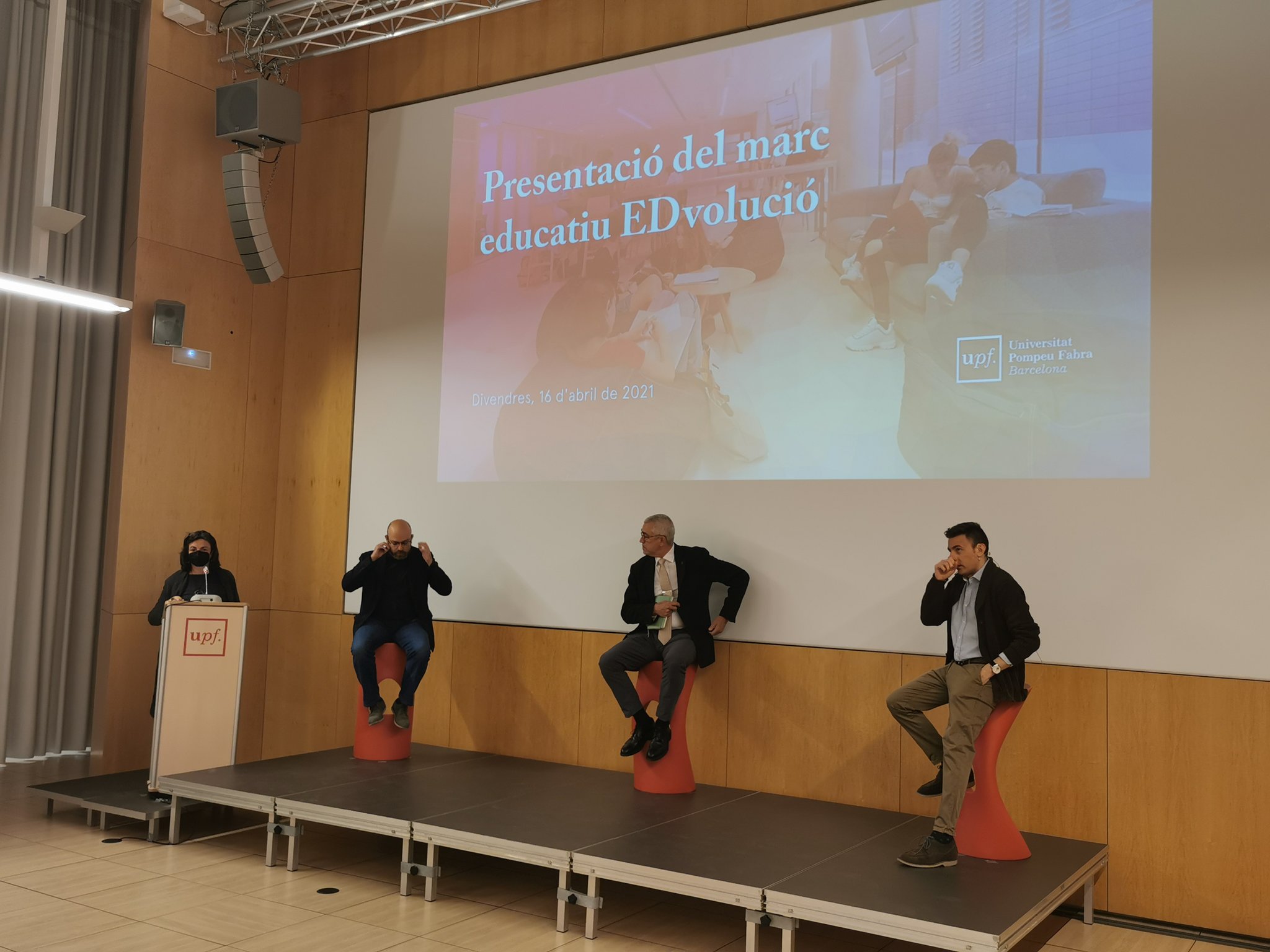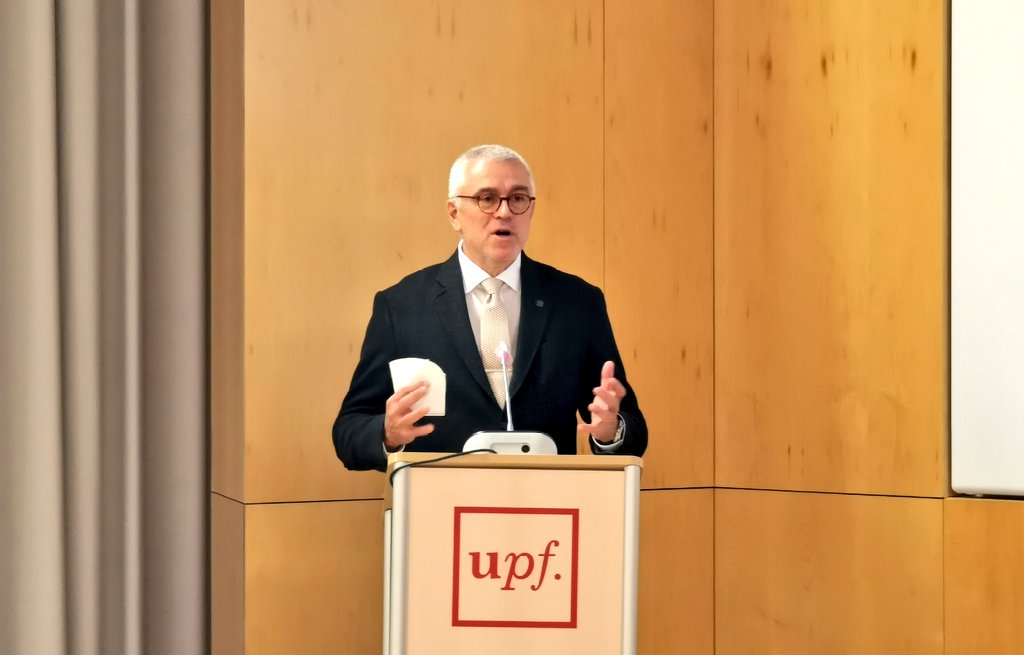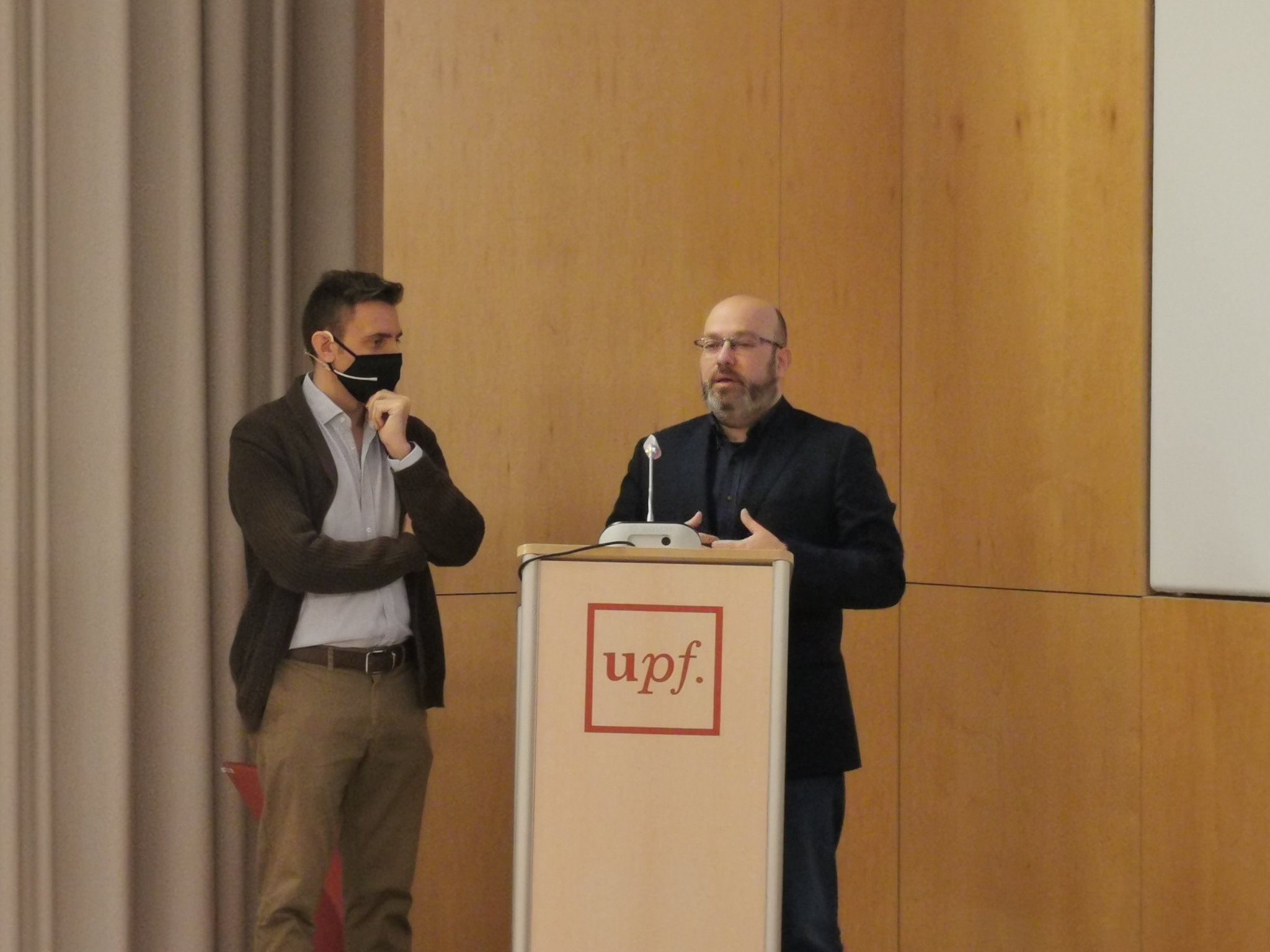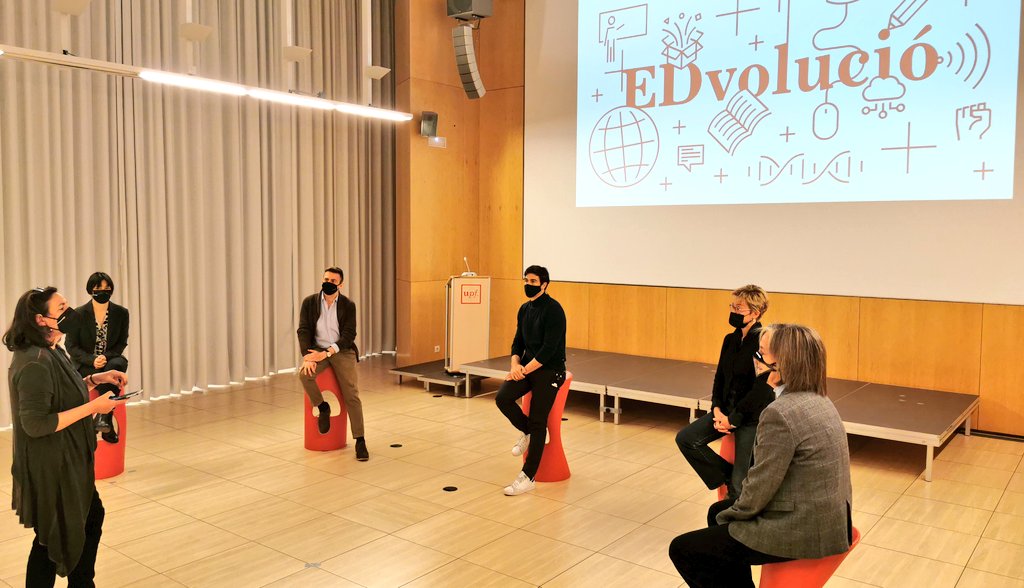“EDvolution, UPF’s new educational framework, the result of an exercise of collective intelligence by the entire university community”
“EDvolution, UPF’s new educational framework, the result of an exercise of collective intelligence by the entire university community”
The first conclusions of EDvolution were presented by its primary stakeholders at an event held on the Ciutadella campus, bringing “i-Week. Educational Innovation Week” to a close. This is the new educational framework that UPF has been working on for the last three years and aims to bring about institutional reflection on the University’s educational model to be able to adapt it to the challenges of the future and the emerging needs of new students.

The first conclusions of EDvolution, the new educational framework that UPF has been working on for the last three years and aims to bring about institutional reflection on the University’s educational model to be able to adapt it to the challenges of the future and the emerging needs of new students, were presented by its primary stakeholders.
The presentation of EDvolution was held on 16 April in the multipurpose room of the Mercè Rodoreda building on the Ciutadella campus, and could be followed by the public via streaming. The presentation meant the closure of I-Week, Week of Educational Innovation, a series of activities carried out between 12 and 16 April, to share UPF’s vision and projects on the latest trends in educational innovation with the university community.
The event was chaired by Mònica Figueras, vice-rector for social commitment and equality projects, who got the event under way by mentioning the successful participation by both internal and external public in i-Week, which involved international experts and lecturers from UPF and other centres, to give a overview of the future of university education.
In the first part, Jaume Casals, rector of the University, explained the framework of the project and his vision of the university of the future, while the promoters of the initiative, Josep Lluís Martí and Manel Jiménez, vice-rector for innovation projects and commissioner for education and communication projects, respectively, outlined the project status and the forthcoming steps for development.
“Bologna, which was a good idea, in the sense of putting the student at the centre, became an artifact, somewhat indigestible”, said Jaume Casals. In his opinion, “we should not be afraid to reflect deeply on what education is at university in general and at UPF in particular”.
Jaume Casals reflected on various aspects that are essential to UPF’s new educational framework, such as intensifying face-to-face actifvities: “The pandemic has helped us to bring some of the university’s essential problems to the forefront”, he pointed out. “This intensification must be understood as the optimization of resources, using them the best way possible to get the best possible benefits”.
In this regard, he spoke about master classes, “there is nothing like a good master class”, he assured, but he stressed that it must be really “masterful”, that is to say, very good, and always at the best possible moment, making them compatible with “heuristic, dialectic activities, that serve to develop the autonomy and talent of students and other members of the university community”.
Jaume Casals: “Responsibility and social and planetary commitment, internationalization, teaching, research, culture and communication projects, university cooperation... all mean the same thing: ‘a university’”.
Jaume Casals emphasized that teaching and research must have a “mutual belonging”, and that the one does not make sense without the other. But we must go further: “Responsibility and social and planetary commitment, internationalization, teaching, research, culture and communication projects, university cooperation... all mean the same thing: ‘a university’”.

In his opening speech, Josep Lluís Martí recalled how the EDvolution project came into being, how it has grown, and which path it has taken, a path that “must follow, is to be continued”.
“Faced with the demise of the Bologna paradigm, the University proposed deep reflection on the educational model. It was a huge challenge and very ambitious, to which I contributed personally, without really knowing how to go about it”, he acknowledged. The vice-rector explained that right from the outset it was clear that it was necessary to think and work together with all university community bodies (teaching and research staff, administration and services staff, students).
Josep Lluís Martí: “We are in a complex, changing world, there is no single, magic formula for everyone”.
Josep Lluís Martí explained that first they studied various benchmarks and models in the world, and from there they gave voice to the various bodies, some sixty people with differing views. Various actions were undertaken, with different methodologies, with the involvement of secondary school students, to give their vision of what they expected and what they would like the university to be like. All this served to draft various summary documents and videos. “This reflection was an exercise of collective intelligence on the part of the members of the university community, a means to clear the way”, he said.
With respect to this process, the vice-rector highlighted some conclusions: a lot of interesting things were being done at UPF, of which he personally had no knowledge; there was a need for a profound change against the inadequacies of Bologna (“there were things to keep, but there was a need for reflection”, he asserted); and the idea that there was no magic formula for the educational model because “we are in a complex, changing world, there is no single magic formula for everyone”.
Then, Josep Lluís Martí explained that it was necessary to seek an integral educational model for the student, beyond what happens in the classroom: talk was no longer about the model but rather about the “educational framework”: “We needed to incorporate a new way of thinking, a common direction, in full autonomy to tailor learning solutions to every need. Like a kind of guide, a general orientation for each student and each teacher, to be able to make appropriate learning decisions”.
Then, Manel Jiménez specified the features of the EDvolution educational framework and spoke of the initial tension that was felt between two forces that cohabit closely in society: change, innovation and evolution, on the one hand, and tradition, which makes you want to preserve what works, on the other. “These two forces, in education, are presented together”, he affirmed.
Manel Jiménez: “We found that at UPF we had good practices that worked, an essence, a certain genuine educational model, with many people who were doing a good job from the standpoint of tradition or with the desire to innovate”.
“We found that at UPF we had good practices that worked, an essence, a certain genuine educational model, with many people who were doing a good job from the standpoint of tradition or with the desire to innovate”, Manel Jiménez acknowledged. According to the commissioner for education and communication projects, based on this acknowledgement, they wished to contribute elements for reflection to build a broader framework to give consistency and quality to the different practices, and treat research and teaching as the one process of knowledge generation.

Core areas and cross-disciplinary competences of EDvolution, and the vision of the UPF community members
Manel Jiménez and Josep Lluís Martí reviewed the core areas and cross-disciplinary competences on which the new EDvolution educational framework is based: the six core areas are: common UPF competences, the teaching model, the learning architecture, support for students, the role of teaching staff, and educational spaces and resources.
Regarding the cross-disciplinary competences, they consist of five blocks: autonomy (capacity for independence); cross-disciplinary and interdisciplinary knowledge; citizen engagement, with a global vision of the world, and civic engagement with global challenges; communication skills and digital competences.
Asked by Josep Lluis Martí, Jaume Casals revealed what he imagined the university of the future would be like: “I see the university of the future as a place where science and skills will be extremely well defined separately so that they can reconcile each other in a timely manner”, he asserted.
This section of the event ended with a video screening, which includes the views of various people and officers related to academia and management belonging to the different bodies of the university community about the EDvolution project and the university of the future.
> The EDvolution educational framework explained by members of the UPF community
Roundtable dealing with several projects that converge within EDvolution
The second part of the session, in roundtable format, enjoyed the participation of relevant stakeholders of the EDvolution initiative: Cristina Gelpí, vice-rector for teaching projects; Pilar Medina, coordinator of the Open Bachelor’s Degree, UPF Minors and UPF Sènior; Manel Jiménez, commissioner for education and communication projects; Pablo Pareja, vice-rector for projects related to faculty affairs, and Ester Oliveras, rector’s delegate for sustainability.
During the roundtable, the speakers reflected on several issues brought to the floor by vice-rector Mònica Figueras, concerning several projects emanating from EDvolution, and which in her view “look different but all converge in this educational framework”.
After Pablo Pareja had compared EDvolution to a “journey that seeks to provoke”, Cristina Gelpí spoke about the facemask she was wearing (a transparent mask designed for deaf people, to interact and show facial expression) as an example of what EDvolution should be like: it is a project driven by students from different areas of UPF based on specific needs of responsibility; useful, as it protects the health; the product of the interaction between teaching and research that has received support from various units of the University.
Pilar Medina, meanwhile, spoke about the UPF Minors, also as a representative project, that manifest students’ open interest in other disciplines. She noted that teaching must have its space for reflection, and stressed the need to redefine the role of the student, to give them greater autonomy, as the person is adult and can make decisions on his or her knowledge.
Other projects and concepts dealt with were students’ social commitment; the UPF Passport, explained by Pablo Pareja; the Student Support Plan, which Manel Jiménez said was fundamental; and the Planetary Wellbeing project: Ester Oliveras mentioned the process of the transformation of teaching that UPF is implementing to incorporate the United Nations sustainable development goals (SDG), for which they have drawn from the EUTOPIA network. The Opening project, which aims to open up the University to society, and internationalization, through projects such as the BAPI or the BISS, were other topics discussed during the roundtable.
Josep Lluís Martí: “We have begun a journey and we are half-way, but it has no end”.
The last part of the session consisted of words from Josep Lluís Martí, Manuel Jiménez and Jaume Casals: “We have begun a journey and we are half-way, but it has no end”, the vice-rector for innovation projects stressed. He recalled that currently the project is at the stage of its finishing touches and is working with various departments of the University, and he thanked all units of UPF for investing in the project.
For his part, Manel Jiménez recalled that “we like being at university, learning from our students, and achieving results with them”. “Our ultimate goal is to develop the university and, beyond that, develop the world”. Finally, Jaume Casals admitted he was “happy” at the end of his mandate: “I see my colleagues happy, I am extremely happy for the work they have done”.

The new EDvolution educational framework
Given the profound and rapid transformation being undergone by society, Pompeu Fabra University recognizes the need for change in the educational model to adapt learning to increasingly global challenges. As a result of this commitment, in the 2017-2018 academic year it was decided to start to reflect from within the University on the institution itself, the teaching, and the role of students, faculty and its staff own.
EDvolution is a commitment to a flexible, cross-cutting, technological and inclusive university that can build itself from within in constant touch with its social environment. It puts student learning at the centre and is designed around the student’s versatility, transdisciplinary and interdisciplinary individual, collective and collaborative learning, the flexibility and openness of the programmes, cooperation between society, enterprise and university, and the integration of teaching and research.
It is a model that provides the student with a comprehensive, versatile outlook to undertake future professions independently and proactively, and provides society with highly skilled professionals, both in theory and in practice, with high technological skills and excellent communication skills.
The mainstreaming that EDvolution seeks to foster has been reflected in projects already implemented at UPF. For example, the Open Bachelor’s Degree, an innovative programme that allows studying subjects from different degree studies during the first year; the minors, additional training which students on any course can choose and are structured around acquiring specific skills, or the architectural reformulation of the Tallers area on the Poblenou campus, with the aim of fostering collaborative, intersectional work between teaching, research and knowledge transfer, and promoting opening up to the campus and the city.
